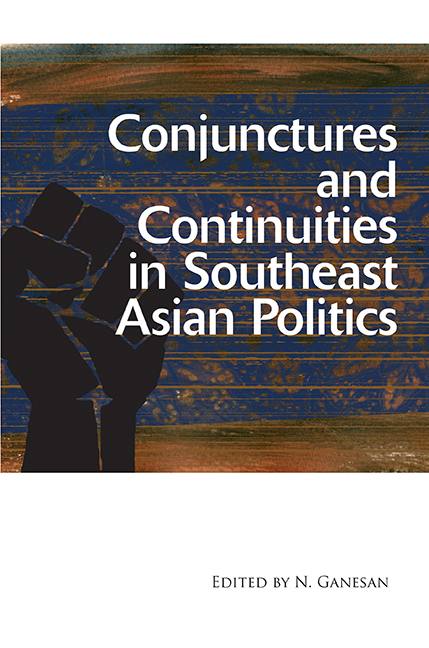Book contents
- Frontmatter
- Contents
- Acknowledgements
- List of Abbreviations
- Contributors
- 1 Conjunctures and Continuities in Southeast Asian Politics
- 2 (Re)Assessing the EDSA “People Power” (1986) as a Critical Conjuncture
- 3 The Road to Doi Moi in 1986: Domestic Dimensions
- 4 The 1988 Uprising in Myanmar: Historical Conjuncture or Praetorian Redux?
- 5 Cambodia's Historical Conjunctures and their Significance
- 6 Changing the Rules: Historical Conjuncture and Transition in Indonesia
- 7 The Resistible Rise of Thaksin Shinawatra: Crisis, Change and the Collapse of Thailand's Democracy
- 8 The March 2008 General Election in Malaysia as a Historical Conjuncture
- 9 Conclusion: Conjunctures and Continuities in Southeast Asia
- Index
5 - Cambodia's Historical Conjunctures and their Significance
Published online by Cambridge University Press: 21 October 2015
- Frontmatter
- Contents
- Acknowledgements
- List of Abbreviations
- Contributors
- 1 Conjunctures and Continuities in Southeast Asian Politics
- 2 (Re)Assessing the EDSA “People Power” (1986) as a Critical Conjuncture
- 3 The Road to Doi Moi in 1986: Domestic Dimensions
- 4 The 1988 Uprising in Myanmar: Historical Conjuncture or Praetorian Redux?
- 5 Cambodia's Historical Conjunctures and their Significance
- 6 Changing the Rules: Historical Conjuncture and Transition in Indonesia
- 7 The Resistible Rise of Thaksin Shinawatra: Crisis, Change and the Collapse of Thailand's Democracy
- 8 The March 2008 General Election in Malaysia as a Historical Conjuncture
- 9 Conclusion: Conjunctures and Continuities in Southeast Asia
- Index
Summary
The main aim of this chapter is to analyse and assess the impact of historical conjunctures on modern Cambodian society. Important changes in modern Cambodia are assessed with the goal of identifying a selected number of historical conjunctures to be included in the study. The conjunctures that are selected are presented empirically and their impact on Cambodian society is outlined. The study also includes a discussion and assessment of the relative importance of the selected conjunctures.
The study is structured in the following way. First, historical conjunctures for inclusion in the study are selected. Second, the selected historical conjunctures are empirically presented. Third, the impact of the conjunctures on Cambodian society is outlined. Fourth, the relative importance of the conjunctures is discussed and assessed in the concluding section.
THE HISTORICAL CONJUNCTURES
Selecting the Historical Conjunctures for Inclusion in the Study
Cambodia's modern history since it gained formal independence from France in 1953 displays a number of relevant historical conjunctures. In the context of this study a select number will be studied. Interestingly, the fact that Cambodia gained independence from France in 1953 is in itself a historical conjuncture since it implied that Cambodia was not part of the First Geneva Conference on Indochina held in 1954 and that the anti-French forces — The Khmer Issarak — were not given any area to regroup in within Cambodia contrary to the situation in both Laos and Vietnam. Instead, some of its cadres were relocated to the Democratic Republic of Vietnam (DRV). This would impact not only on the country but also on the perception of Vietnam within the Cambodian communist movement. Notwithstanding the importance of this event it will not be included in the study. Instead, historical conjunctures ranging over a period from 1970 to the early 1990s will be included. They are the overthrow of Prince Norodom Sihanouk in 1970, the fall of Phnom Penh in 1975, the military intervention of Cambodia by Vietnam in 1978–79, and the United Nations' peacekeeping operation in Cambodia in 1992–93.
- Type
- Chapter
- Information
- Conjunctures and Continuities in Southeast Asian Politics , pp. 103 - 122Publisher: ISEAS–Yusof Ishak InstitutePrint publication year: 2013



